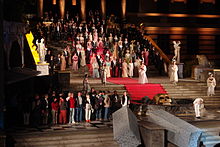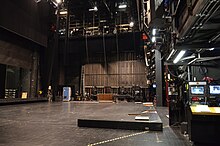Mecklenburg State Theater Schwerin

The Mecklenburg State Theater is a six-part theater in the state capital Schwerin and the city of Parchim. The GmbH is supported by the state of Mecklenburg-Western Pomerania (74.9%), the district of Ludwigslust-Parchim (10%), the state capital Schwerin (10%) and the city of Parchim (5.1%). In addition to numerous new productions, the theater annually organizes the Schwerin Castle Festival in the middle of the residential ensemble with Schwerin Castle , State Theater and State Museum . Lars Tietje has been General Director and Managing Director since August 1, 2016 , and Daniel Huppert is General Music Director . The theater's artistic directors also consist of Angela Kalms (artistic operations director), Toni Burkhardt (opera director), Martin Nimz (drama director), Jutta Ebnother (ballet director), Rolf Petersen (director of the Fritz Reuter stage), Thomas Ott-Albrecht (director of the Junge Staatstheaters Parchim), Peter Larsen (chief dramaturge), Victoria Louise Tafferner (director of the Mecklenburgische Staatskapelle Schwerin) and Nele Tippelmann (director of theater education, mediation and participation).
In June 2020 it was announced that general management would be transferred to Hans-Georg Wegner for the 2021/2022 season . Christian Schwandt will be the new commercial director.
history
The beginning of Schwerin's music and theater history is generally regarded on June 17, 1563, when Duke Johann Albrecht I of Mecklenburg appointed Kapellmeister David Köler (* before 1532, † 1565) as court conductor and at the same time commissioned him to found a court orchestra . This court orchestra is the origin of today's Mecklenburgische Staatskapelle Schwerin , which is considered the third oldest orchestra in Germany after Dresden and Kassel .
In 1753, the actor Conrad Ekhof (1720–1778) , who was already known as the father of German drama during his lifetime, co-founded the first German theater academy in Schwerin.
Under the reign of Frederick the Pious from 1756, the focus of music shifted from theater and dance music to church music. From 1767 (for 70 years) the Mecklenburg-Schwerin court orchestra had to take its seat in the new royal seat of Ludwigslust . From 1790 operas were performed in Ludwigslust. In 1801, Friedrich Franz I of Mecklenburg founded a chapel with only nine members called Harmonie , which was merged with the existing court chapel in 1839. In 1840 the Second North German Music Festival took place in Schwerin , at which 150 orchestral musicians and 340 choir singers performed under the direction of Felix Mendelssohn Bartholdy .
In 1886, after five years of construction, the theater began to play in the new building in Alter Garten 2 of the now Grand Ducal Court Theater . On November 15, 1918, the theater was renamed the State Theater . In 1926 it was named the Mecklenburg State Theater . During this time, the Low German Stage was connected to the State Theater. The theater continued until August 31, 1944, the day all theaters were closed by Reich Propaganda Minister Goebbels .
After the Second World War , games could be resumed immediately in the building that had been spared from destruction. Werner Bernhardy was artistic director from May 1945 to 1947 , then the Berlin actor and director Josef R. Lorandt for a few months until his death, after which a board of trustees, including Edgar Bennert and Lucie Höflich , headed the house.
The Castle Festival has been taking place every summer since 1993 , the backdrop of which has been moved from the inner courtyard of Schwerin Castle to the Old Garden since 1999 . In that year, Aida attracted more than 50,000 visitors. The previous record with over 70,000 visitors came in 2001 with the Verdi opera Nabucco .
In 2011 the theater was invited to the Berlin Theatertreffen with Herbert Fritsch's production of Gerhart Hauptmann's Der Biberpelz .
In 2011, the Schlossfestspiele presented Der Freischütz by Carl Maria von Weber for the first time on the open-air stage in the castle garden due to the renovation of the Old Garden. In the following years the number of visitors decreased slightly. With Leonard Bernstein's West Side Story , the first musical production in the Alter Garten, significantly more visitors visited the festival in 2017 than in the previous year. In 2018, for the first time, the theater will be showing both the Alten Garten Schwerin (with the opera Tosca ) and the renovated courtyard (with the play Dracula ). The musical Anatevka in the Old Garden and the play Cyrano de Bergerac in the palace courtyard are planned for 2019 .
On August 1, 2016, the former Mecklenburgisches Staatstheater Schwerin gGmbH (sponsored by the State Capital Schwerin) merged with the former Zweckverband Mecklenburgisches Landestheater Parchim (sponsored by the Ludwigslust-Parchim district and the city of Parchim) to form today's Mecklenburgisches Staatstheater GmbH. As the main shareholder, the state of Mecklenburg-Western Pomerania took over 74.9% of the theater. The Mecklenburg State Theater is thus the only state theater in Mecklenburg-Western Pomerania to date.
As part of the state-wide theater structure reform initiated by the state government and the then Minister for Education, Science and Art, Mathias Brodkorb (SPD), the theater has to perform other significant consolidation services in addition to the merger. a. lead to a reduction in the number of productions and events in the theater. In addition to the Mecklenburgische Staatskapelle Schwerin, which is Germany's smallest A orchestra with 58 members, a. the opera choir will be reduced to 24 and the ballet ensemble to 14 members. In addition, members of the orchestra and opera choir only receive 84% or 90% of the remuneration to which they are entitled under the collective wage agreement. The compensation takes place v. a. through additional free time. In return, the state assumes the main responsibility for the entire GmbH as well as structurally for the historic main building at the Alter Garten and supports the construction of a new theater at the Parchim location as a replacement for the former theater building of the Mecklenburg State Theater in Parchimer Blutstraße, which has been closed since 2014 due to significant security deficiencies.
Directors
- Friedrich von Flotow 1855–1863
- Gustav Gans zu Putlitz 1863–1867
- Alfred von Wolzüge 1867–1883
- Carl von Ledebur 1883–1910
...
- Werner Bernhardy 1945–1947
- Josef R. Lorandt 1947
- (Headed by a board of trustees) 1947–1948
- Otto Kähler 1948–1949 // Lucie Höflich 1947–1950 (?)
- Edgar Bennert provisionally 1949–1951, 1951–1960
...
- Martin Hellberg 1962–1963, general manager
...
- Christoph Schroth 1974–1989, director
- Fritz Wendrich 1981–1982 (?), General manager
- Joachim Kümmritz , 1993–1999 Managing Director, 1999–2016 General Director
- Lars Tietje , general manager since 2016
architecture
The theater, originally built by court architect Georg Adolf Demmler in a classical style on the site of the current building, burned down in April 1882 during a performance. The theater initially moved into a provisional wooden building on the station forecourt, which offered space for 1,100 spectators and enabled the theater to continue playing during the new construction phase. The new house was designed by court architect Georg Daniel and completed between 1883 and 1886. On the day of the opening on October 3, 1886, the new building, modeled on the Italian Renaissance, was one of the most progressive theater buildings in the world at the time. From 1919 to 1933, the State Theater served as the first democratic parliament and state parliament of the Free State of Mecklenburg-Schwerin .
Theater operations
The total annual number of visitors is around 180,000, which is a remarkable achievement in proportion to the size of the city of Schwerins, which has around 96,000 inhabitants. Every year the theater brings out up to 30 new productions in the various fields at both locations. The house is perceived as a cultural beacon far beyond the region.
Both previous theaters - the Mecklenburg State Theater in Schwerin and the Mecklenburg State Theater in Parchim - are firmly anchored in their respective urban communities. The "Association of Friends and Sponsors of the Mecklenburg State Theater Schwerin eV", which also has a community foundation, is one of the largest theater sponsoring associations with over 1200 members.
Divisions
The Mecklenburg State Theater offers performances in the various branches
- Music theater (opera, operetta, musical)
- play
- ballet
- Low German Drama (Fritz Reuter Stage)
- Children's and youth theater (Parchim Young State Theater)
- Concert (Mecklenburgische Staatskapelle Schwerin)
In addition, guest performances and special events take place at the venues. Citizens also play and dance in several play clubs in Schwerin and Parchim under the supervision of professional artists from the house. Design in the E-Werk-Studio v. a. Members of the drama company have their own program.
Venues
In addition to the historic Great House in the Old Garden including the concert foyer , performances will also take place in the studio stage in the E-Werk and at the Parchim location in the painting room and in the Parchim town hall. A highlight of every season are the Castle Festival of the Mecklenburg State Theater Schwerin, which annually presents great operas and musicals as an open-air concert with a view of the Schwerin Castle.
Honorary members
| Surname | Life dates | Year of appointment |
|---|---|---|
| Rosa Otto-Martineck | 1836-1928 | 1897 |
| Theodor Wachtel | 1823-1893 | ? |
Individual evidence
- ^ NDR: Mecklenburgisches Staatstheater gets double leadership. Retrieved June 10, 2020 .
- ↑ Mecklenburg Schwerin delüx Special March 2011, page 103
- ↑ Director Christoph Schroth will receive the Federal Cross of Merit on Sunday at the Cottbus State Theater. Retrieved July 25, 2019 .
Web links
Coordinates: 53 ° 37 ′ 37 ″ N , 11 ° 25 ′ 2 ″ E




